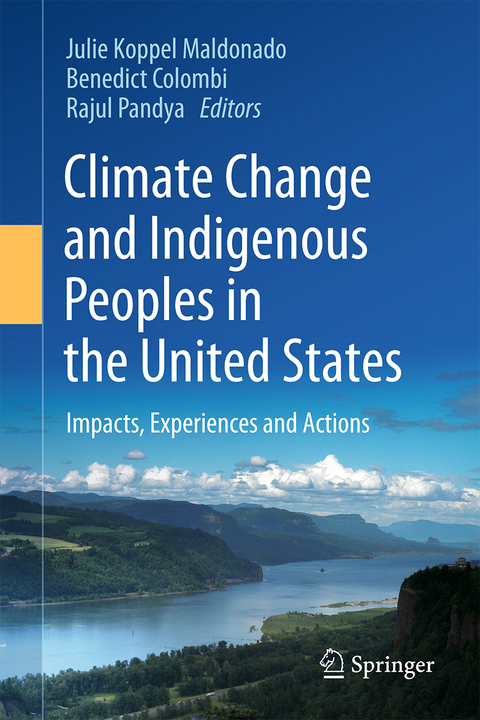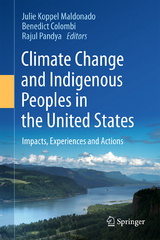Climate Change and Indigenous Peoples in the United States
Springer International Publishing (Verlag)
978-3-319-05265-6 (ISBN)
With a long history and deep connection to the Earth's resources, indigenous peoples have an intimate understanding and ability to observe the impacts linked to climate change. Traditional ecological knowledge and tribal experience play a key role in developing future scientific solutions for adaptation to the impacts. The book explores climate-related issues for indigenous communities in the United States, including loss of traditional knowledge, forests and ecosystems, food security and traditional foods, as well as water, Arctic sea ice loss, permafrost thaw and relocation. The book also highlights how tribal communities and programs are responding to the changing environments. Fifty authors from tribal communities, academia, government agencies and NGOs contributed to the book.
Previously published in Climatic Change, Volume 120, Issue 3, 2013.
Fifty authors from tribal communities, academia, government agencies and NGOs contributed to the book, which explores climate-related issues in indigenous communities in the U.S., including loss of traditional knowledge, forests and ecosystems; food security and traditional foods and water, Arctic sea ice loss, permafrost thaw and relocation.
Introduction: Climate Change and Indigenous Peoples of the USA.- Justice Forward: Tribes, Climate Adaptation and Responsibility.- Culture, Law, Risk and Governance: Contexts of Traditional Knowledge in Climate Change Adaptation.- The Impacts of Climate Change on Tribal Traditional Foods.- Indigenous Frameworks for Observing and Responding to Climate Change in Alaska.- Climate Change Impacts on the Water Resources of American Indians and Alaska Natives in the U.S..- Climate Change in Arid Lands and Native American Socioeconomic Vulnerability: The Case of the Pyramid Lake Paiute Tribe.- The Impact of Climate Change on Tribal Communities in the US: Displacement, Relocation and Human Rights.- Cultural Impacts to Tribes from Climate Change Influences on Forests.- Changing Stream flow on Columbia Basin Tribal Lands- Climate Change and Salmon.- Exploring Effects of Climate Change on Northern Plains American Indian Health.- The Effect of Climate Change on Glacier Ablation and Base flow Support in the Nooksack River Basin and Implications on Pacific Salmonid Species Protection and Recovery.- Re-thinking Colonialism to Prepare for the Impacts of Rapid Environmental Change.
From the book reviews:
"The articles in this collection lend timely evidence and detailed research to individuals and organizations seeking new solutions to the climate change crisis. They offer new paradigms for viewing ecological shifts, and negotiating the relationship between lawmakers, environmental scientists, and tribes indigenous to the United States. It also offers new and useful vocabulary for future researchers and policy makers ... . this book will undoubtedly support and inspire further research." (Rose Sayre, Natural Hazards Observer, Vol. XXXIX (3), January, 2015)| Erscheint lt. Verlag | 14.5.2014 |
|---|---|
| Zusatzinfo | VIII, 174 p. 20 illus., 3 illus. in color. |
| Verlagsort | Cham |
| Sprache | englisch |
| Maße | 155 x 235 mm |
| Gewicht | 446 g |
| Themenwelt | Geisteswissenschaften ► Archäologie |
| Naturwissenschaften ► Biologie ► Ökologie / Naturschutz | |
| Naturwissenschaften ► Geowissenschaften ► Meteorologie / Klimatologie | |
| Sozialwissenschaften | |
| Schlagworte | Changing Streamflow • climate adaptation • climate change • Climate Change and Indigenous Peoples of the USA • Climate Change and Tribal Communities • Climate Change in Alaska • Climate Change Management • Traditional Knowledge in Climate Change Adaptation • Tribal Traditional • Water Resources and American Indians |
| ISBN-10 | 3-319-05265-9 / 3319052659 |
| ISBN-13 | 978-3-319-05265-6 / 9783319052656 |
| Zustand | Neuware |
| Haben Sie eine Frage zum Produkt? |
aus dem Bereich




